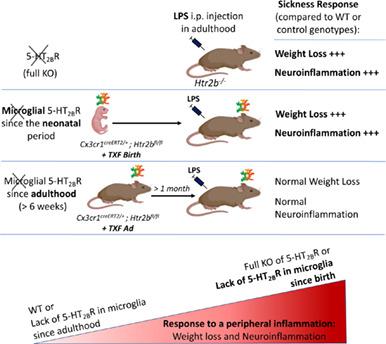Our official English website, www.x-mol.net, welcomes your feedback! (Note: you will need to create a separate account there.)
The serotonin 2B receptor is required in neonatal microglia to limit neuroinflammation and sickness behavior in adulthood
Glia ( IF 6.2 ) Pub Date : 2020-10-23 , DOI: 10.1002/glia.23918 Catherine Béchade 1, 2, 3 , Ivana D'Andrea 1, 2, 3 , Fanny Etienne 1, 2, 3 , Franck Verdonk 4 , Imane Moutkine 1, 2, 3 , Sophie M Banas 1, 2, 3 , Marta Kolodziejczak 1, 2, 3 , Silvina L Diaz 1, 2, 3 , Christopher N Parkhurst 5 , Wenbiao B Gan 5 , Luc Maroteaux 1, 2, 3 , Anne Roumier 1, 2, 3
Glia ( IF 6.2 ) Pub Date : 2020-10-23 , DOI: 10.1002/glia.23918 Catherine Béchade 1, 2, 3 , Ivana D'Andrea 1, 2, 3 , Fanny Etienne 1, 2, 3 , Franck Verdonk 4 , Imane Moutkine 1, 2, 3 , Sophie M Banas 1, 2, 3 , Marta Kolodziejczak 1, 2, 3 , Silvina L Diaz 1, 2, 3 , Christopher N Parkhurst 5 , Wenbiao B Gan 5 , Luc Maroteaux 1, 2, 3 , Anne Roumier 1, 2, 3
Affiliation

|
Severe peripheral infections induce an adaptive sickness behavior and an innate immune reaction in various organs including the brain. On the long term, persistent alteration of microglia, the brain innate immune cells, is associated with an increased risk of psychiatric disorders. It is thus critical to identify genes and mechanisms controlling the intensity and duration of the neuroinflammation induced by peripheral immune challenges. We tested the hypothesis that the 5‐HT2B receptor, the main serotonin receptor expressed by microglia, might represent a valuable candidate. First, we observed that Htr2b−/− mice, knock‐out for the 5‐HT2B receptor gene, developed, when exposed to a peripheral lipopolysaccharide (LPS) challenge, a stronger weight loss compared to wild‐type mice; in addition, comparison of inflammatory markers in brain, 4 and 24 hr after LPS injection, showed that Htr2b deficiency leads to a prolonged neuroinflammation. Second, to assess the specific contribution of the microglial 5‐HT2B receptor, we investigated the response to LPS of conditional knock‐out mice invalidated for Htr2b in microglia only. We found that deletion of Htr2b in microglia since birth is sufficient to cause enhanced weight loss and increased neuroinflammatory response upon LPS injection at adult stage. In contrast, mice deleted for microglial Htr2b in adulthood responded normally to LPS, revealing a neonatal developmental effect. These results highlight the role of microglia in the response to a peripheral immune challenge and suggest the existence of a developmental, neonatal period, during which instruction of microglia through 5‐HT2B receptors is necessary to prevent microglia overreactivity in adulthood.
中文翻译:

新生儿小胶质细胞需要血清素 2B 受体来限制成年期的神经炎症和疾病行为
严重的外周感染会在包括大脑在内的各种器官中诱发适应性疾病行为和先天免疫反应。从长远来看,小胶质细胞(大脑先天免疫细胞)的持续改变与精神疾病风险增加有关。因此,确定控制由外周免疫挑战引起的神经炎症强度和持续时间的基因和机制至关重要。我们检验了小胶质细胞表达的主要血清素受体5-HT 2B受体可能代表有价值的候选者的假设。首先,我们观察到Htr2b -/-小鼠敲除 5-HT 2B受体基因,当暴露于外周脂多糖 (LPS) 挑战时,与野生型小鼠相比,体重减轻更强;此外,LPS 注射后 4 小时和 24 小时脑中炎症标志物的比较表明,Htr2b缺乏会导致神经炎症延长。其次,为了评估小胶质细胞 5-HT 2B受体的具体贡献,我们研究了仅在小胶质细胞中对Htr2b无效的条件性敲除小鼠对 LPS 的反应。我们发现自出生以来小胶质细胞中Htr2b的缺失足以在成年阶段注射 LPS 后导致体重减轻和神经炎症反应增加。相比之下,小鼠删除了小胶质细胞Htr2b成年后对 LPS 的反应正常,显示出对新生儿发育的影响。这些结果突出了小胶质细胞在应对外周免疫挑战中的作用,并表明存在一个发育的新生儿期,在此期间,通过 5-HT 2B受体指导小胶质细胞对于防止成年期小胶质细胞过度反应是必要的。
更新日期:2020-10-23
中文翻译:

新生儿小胶质细胞需要血清素 2B 受体来限制成年期的神经炎症和疾病行为
严重的外周感染会在包括大脑在内的各种器官中诱发适应性疾病行为和先天免疫反应。从长远来看,小胶质细胞(大脑先天免疫细胞)的持续改变与精神疾病风险增加有关。因此,确定控制由外周免疫挑战引起的神经炎症强度和持续时间的基因和机制至关重要。我们检验了小胶质细胞表达的主要血清素受体5-HT 2B受体可能代表有价值的候选者的假设。首先,我们观察到Htr2b -/-小鼠敲除 5-HT 2B受体基因,当暴露于外周脂多糖 (LPS) 挑战时,与野生型小鼠相比,体重减轻更强;此外,LPS 注射后 4 小时和 24 小时脑中炎症标志物的比较表明,Htr2b缺乏会导致神经炎症延长。其次,为了评估小胶质细胞 5-HT 2B受体的具体贡献,我们研究了仅在小胶质细胞中对Htr2b无效的条件性敲除小鼠对 LPS 的反应。我们发现自出生以来小胶质细胞中Htr2b的缺失足以在成年阶段注射 LPS 后导致体重减轻和神经炎症反应增加。相比之下,小鼠删除了小胶质细胞Htr2b成年后对 LPS 的反应正常,显示出对新生儿发育的影响。这些结果突出了小胶质细胞在应对外周免疫挑战中的作用,并表明存在一个发育的新生儿期,在此期间,通过 5-HT 2B受体指导小胶质细胞对于防止成年期小胶质细胞过度反应是必要的。



























 京公网安备 11010802027423号
京公网安备 11010802027423号